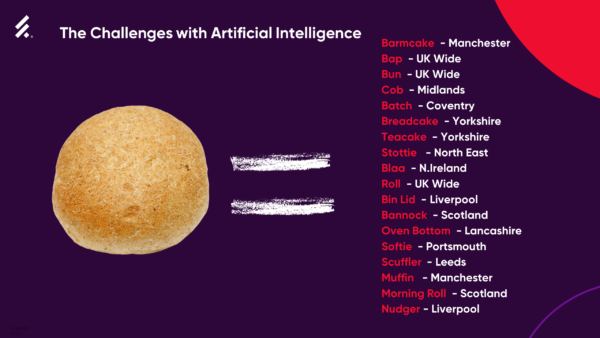
FourNet unveils unique new shared housing technology platform

The UK’s countless dialects and lexical variations currently pose a problem for the housing sector, faced with recently introduced Tenant Satisfaction Measures.
Why?
Because one tenant’s bannock is another’s bread roll, batch, stottie, blaa or even bin lid. There are at least another dozen British phrases for a tasty piece of baked dough, bun, bap, cob, teacake and softie for instance.
That’s not to mention the word for bread in Punjabi, Mandarin, Urdu, Arabic, or Portuguese.
While artificial intelligence (AI) is the buzzword for all sectors and professions each working out what it can – and can’t – do, it’s only as good as the information it is fed.
But what if AI tools used by housing organisations were able to distinguish different dialects and languages, and therefore fully understand tenant language and sentiment across the UK in real time? How much would that assist the housing sector?
For many of the 1,000+ housing associations across the country, the cost of developing their own AI technology, able to fully understand tenants in their region and to perform the tasks which would make their organisations more efficient, is hugely prohibitive.
AI revolution
A recent LinkedIn survey we conducted, backing up our own data, suggests that within the housing sector, 40% believe that AI could revolutionise services for organisations and tenants, particularly to identify and help the most vulnerable.
AI could also be utilised, the poll responses suggest, to help reduce operating costs (20%), improve accessibility (20%) and provide a better tenant experience (20%).
But at present very few housing organisations are using AI tools to deliver or support services.
Enter FourNet.
As customer experience and digital transformation experts with a range of housing association customers, we know from experience in the private and public sectors where AI can help the housing sector and the problems it can solve.
Our unique, market-leading CX (Customer/tenant Experience) specialist consultancy teams get to the root cause of an organisation’s problems with outcome focused, data-driven diagnosis which helps us to find or build the best tailor-made solution.
Real time voice analytics technology delivers call handling time efficiencies, automation of the quality monitoring framework on the spoken elements of a call, improving outcomes and importantly supporting vulnerable customers
But we are going further.
Shared technology
FourNet is building a new and unique shared housing sector service which will cut the cost for organisations to buy, install, use and manage sector-specific AI tools.
It will revolutionise the way the sector can utilise market leading solutions, ranging from assisting with debt and arrears, vulnerable customers, government support and assisted living, to applying for new homes and moving in or out, booking repairs and reporting other issues.
We’re building a housing specific large language model (LLM) which will cope with bannocks, buns, tea cakes and much, much more.
It can be shared across associations, reducing the cost to implement, accelerating benefit delivery and delivering benefits and best practice to citizens and tenants in all housing organisations irrespective of size.
That means inbound and outbound conversations can be analysed for sentiment, offering real time assistance for your agents and tenants on each and every call – identifying vulnerable customers and potential assistance, and providing real time support to agents and their own wellbeing.
Analysing tenant satisfaction
In recent years, sentiment analysis has become more widely used and it is now a rapidly growing field. Advances in natural language processing (NLP) and machine learning have led to more accurate sentiment analysis.
With the Tenant Satisfaction Measures (TSM) that came into effect in April 2023, understanding the sentiment of tenants has become more critical than ever.
While the TSM survey questions themselves have fixed responses, the verbatim comments could be a valuable source of additional data for housing associations on the reasons behind that feedback, enabling data led strategies on what improvements and changes need to be made.
Understanding both emotions and sentiments in natural language processing (NLP) is important because they each provide different and complementary information.
Sentiment refers to the polarity of a text, whether it is positive, negative or neutral. It’s useful for quickly getting a general understanding of the attitude expressed in a text.
Emotion, on the other hand, refers to the feelings or states of mind evoked by a text, such as anger, joy, fear, or sadness. Emotion analysis is more nuanced than sentiment analysis because it attempts to capture the complex and multi-dimensional nature of human emotions.
Understanding emotions in addition to the sentiment can provide deeper understanding insights into the impact an experience had or is having on a customer.
Sentiment analysis and the housing sector
With such a growing, diverse cultural make up across UK housing associations, multilingual sentiment analysis has become ever more important.
Advanced machine learning models that can accurately analyse sentiment in multiple languages and dialects are key to the housing sector’s issues.
The ability to analyse sentiment in real-time, integrated with chatbots, voice assistants and recommendation engines providing support to both agents and customers are what is required.
Sentiment analysis has moved beyond simply identifying positive or negative sentiment, to detecting emotions such as anger, joy, or sadness. This will enable organisations to provide more personalised customer experiences and make more informed decisions.
And that’s why we are pleased to launch our next generation housing service – shared, cost-effective, powered by AI, and by FourNet.
If you want more details on how we can help, please get in touch.